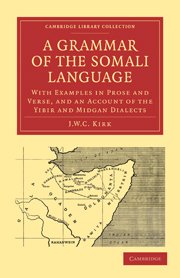 A Grammar of the Somali Language
A Grammar of the Somali Language 8. All languages cannot be arranged on exactly the same system, and, in the Somali Language, the arrangement and definitions which are applicable to the grammar of well-known tongues, such as English or Arabic, will not altogether hold good.
Somali is undoubtedly a simple and elementary language, in which the only true and fundamental parts of speech are
Substantive, Verb, Adjective, Particle,
and it is by various combinations or forms of these that the other generally recognised parts of speech are formed.
9. A Substantive is a word describing, or referring to, something which exists, or some object of thought, either material or immaterial.
A Verb is a word expressing thought, being, action, or the suffering of action, and affirms or predicates something of some person or thing.
These two parts of speech are complementary and essential one to the other, and in any form of speech both these elements must necessarily occur, unless it is tacitly agreed, to save unnecessary verbiage, that one or the other may be obviously understood from the context, and may be omitted from actual expression.
An Adjective is a word which describes or qualifies the object or thought represented by a substantive, according to any known idea of quality, such as colour, size, nature, etc.
A Particle is a word which has no meaning in itself and can only occur in conjunction with other parts of speech.
To save this book to your Kindle, first ensure no-reply@cambridge.org is added to your Approved Personal Document E-mail List under your Personal Document Settings on the Manage Your Content and Devices page of your Amazon account. Then enter the ‘name’ part of your Kindle email address below. Find out more about saving to your Kindle.
Note you can select to save to either the @free.kindle.com or @kindle.com variations. ‘@free.kindle.com’ emails are free but can only be saved to your device when it is connected to wi-fi. ‘@kindle.com’ emails can be delivered even when you are not connected to wi-fi, but note that service fees apply.
Find out more about the Kindle Personal Document Service.
To save content items to your account, please confirm that you agree to abide by our usage policies. If this is the first time you use this feature, you will be asked to authorise Cambridge Core to connect with your account. Find out more about saving content to Dropbox.
To save content items to your account, please confirm that you agree to abide by our usage policies. If this is the first time you use this feature, you will be asked to authorise Cambridge Core to connect with your account. Find out more about saving content to Google Drive.